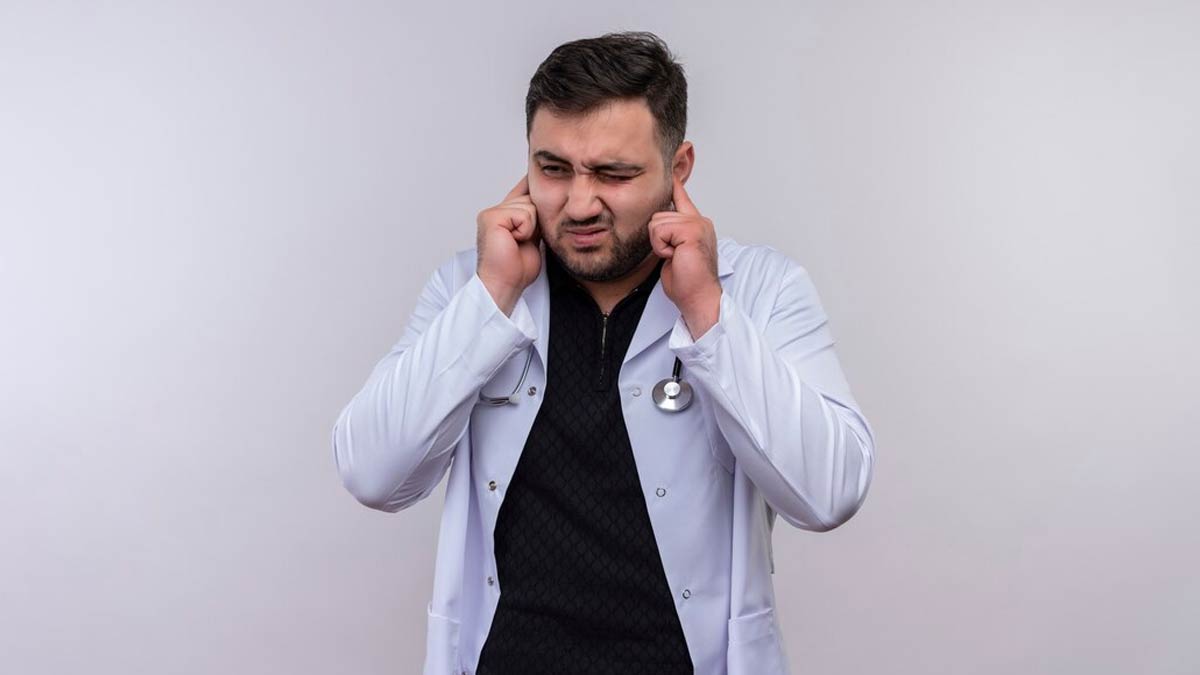
Tinnitus is a condition related to the internal ears, which causes a persistent ringing, buzzing, or hissing sound in the ears without any external source. This phantom noise can be disruptive and distressing. It can be irritating for those who experience it.
Table of Content:-
What is Tinnitus?
“If tinnitus is left untreated, lack of sleep and a continual buzz can lead to mental trauma and severe mental illness. Tinnitus can be either unilateral (in one ear) or bilateral. It could be synchronised with the pulse, buzzing, rumbling, hammering like steam escaping, the sound of bells, etc. Tinnitus implies a problem with the auditory (hearing) system, the sensory organ, or the central link,” said Dr Nassirruddin, ENT Specialist from Apollo Spectra Hospital, Kondapur, Hyderabad.

Also read : Ruptured Eardrum: Symptoms And Treatment
Causes of Tinnitus
“Tinnitus can be a sign of hearing loss in certain severe conditions, but it can also occur without any serious underlying causes. Ringing sensations and buzzing sounds in the ears and head are caused by a variety of factors, including pressure from impacted wax, whiplash, head injury, and exposure to loud noise,” said Dr Nassirruddin.
Exposure to Loud Noise
Prolonged exposure to loud noises, such as concerts, heavy machinery, or firearms, can damage the delicate hair cells in the inner ear, leading to tinnitus.
Age-related Hearing Loss
As individuals age, the natural wear and tear on the auditory system can result in hearing loss, often accompanied by tinnitus.
Medical Conditions
“It can be caused due to other medical conditions, like Meniere's disease, otosclerosis, and temporomandibular joint (TMJ) disorders,” said Dr Nassirrudin.
Also read: Ear Infection Increases During Monsoon: Here's How You Can Deal With It Naturally
Medications
Some medications, such as certain antibiotics, antidepressants, and nonsteroidal anti-inflammatory drugs (NSAIDs), may have tinnitus as a side effect.
Symptoms of Tinnitus
The primary symptom is the perception of sounds that are not present in the external environment. Tinnitus can be continuous or intermittent, and its intensity may vary.
Impact on Concentration
The constant noise can affect concentration and focus, leading to difficulties in daily activities. Tinnitus may interfere with sleep, causing insomnia or difficulty falling asleep.
Treatment Options
While there is no definitive cure for tinnitus, several management strategies can help alleviate its impact:
Hearing Aids
For people with hearing loss, hearing aids can amplify external sounds, reducing the perception of tinnitus.

Sound Therapy
Background noise, such as white noise or nature sounds, can help mask the tinnitus noise, making it less noticeable.
Counselling
According to the Korean Journal of Audiology, counselling, particularly cognitive-behavioural therapy (CBT), can assist individuals in developing coping mechanisms and reducing the emotional impact of tinnitus.
Medication
In some cases, medications may be prescribed to address specific underlying conditions contributing to tinnitus or to manage its symptoms.
Lifestyle Changes
Adopting a healthy lifestyle, including stress management, regular exercise, and a balanced diet, may contribute to overall well-being and potentially alleviate tinnitus symptoms.
How To Prevent Tinnitus
It is advisable to use ear protection in loud environments and limit exposure to excessive noise. Practice stress-reducing techniques, such as mindfulness and relaxation exercises. And also be aware of potential side effects of medications and consult with healthcare professionals if tinnitus develops. Keep ears clean and avoid using cotton swabs, which can push earwax deeper into the ear canal.
Tinnitus, while often challenging, is a symptom that can be managed with the right approach. Understanding its potential causes, recognising symptoms, and exploring various treatment options can empower individuals to effectively cope with tinnitus and improve their overall quality of life. If you or someone you know is experiencing persistent tinnitus, seeking advice from a doctor is important for proper diagnosis and personalised management strategies.
Read Next
Are You Using A Proper Filter Before Drinking Water? Know About the Importance Of Filtering Water
How we keep this article up to date:
We work with experts and keep a close eye on the latest in health and wellness. Whenever there is a new research or helpful information, we update our articles with accurate and useful advice.
Current Version